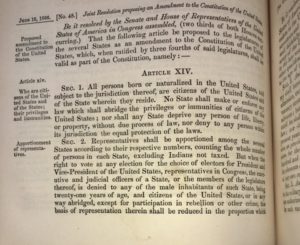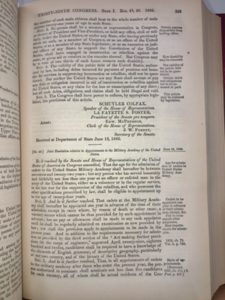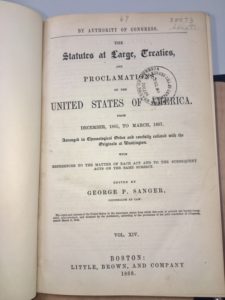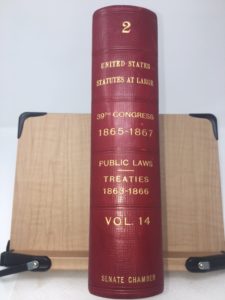14th Amendment – Senate Copy of the Statutes at Large from 1865-1867
Joint Resolution 48 proposing the 14th Amendment, June 16, 1866
The 14th Amendment is now widely recognized as not only one of the most important amendments, but one of the most important provisions in the entire Constitution.
Section 1 begins by declaring that all persons born or naturalized in the U.S. are citizens of the U.S. and of the state of their residence. This is the first, official, national definition of citizenship. In particular, the broadly written civil rights provisions in the Due Process and Equal Protection clauses provide that no state can abridge the rights of citizens of the United States or “deprive any person of life, liberty or property without due process of law nor deny to any person within its jurisdiction the equal protection of the laws.” The less important and often overlooked Privileges and Immunities clause further provides that no state “shall make or enforce any law which shall abridge the privileges or immunities of citizens of the United States.”
Northern Republicans understood the irony of the Civil War – that the South stood to gain additional representation in Congress if the original 3/5th Compromise was repealed. Section 2 thus grew out of an understandable effort to avoid rewarding the South unless it fairly shared the franchise with the newly freed slaves. Section 2 offered the South a choice.
Section 2 provides that if a state denied the right to vote to any of its adult “male inhabitants” its representation in the House and the electoral college would be proportionately reduced. The clause has never been invoked. Even today, if a state were found to be suppressing voting, this is a mechanism to penalize the state, separate and apart from the statutory enforcement provisions in the Voter Protection Act.
Interestingly, Section 2 is the first time that the Constitution makes reference to gender. By dealing with voting rights for former slaves but ignoring voting rights for women, the 14th Amendment provoked a strong reaction from the women’s right movement.
Section 3 is now an obsolete provision disqualifying any person from elected office who had aided the Confederacy during the Civil War, unless and until Congress voted by a 2/3 margin to remove the disability. Section 4 provided that
Confederate war debt was null and void, along with claims for emancipated slaves. In Section 5 Congress delegated enforcement powers to Congress. Southern states recognized that they would not be admitted into the union – and reconstruction would not end – until they ratified the 14th Amendment. Nevertheless, ten southern states initially and overwhelmingly refused to ratify because of the “controversial” nature and stigma of Section 3. President Johnson specifically advised the Southern States to defeat the 14th Amendment. Tennessee was the only exception, gaining quicker re-admittance. This refusal to ratify led to the adoption of the Reconstruction Acts, which among other things required the south to adopt the 14th Amendment to regain representation in Congress.





